Born and raised in Alice, Eastern Cape — the town that educated some of South Africa’s most influential leaders, artists and intellectuals — Asanda Sizani has made her mark in the creative world as an editor, creative consultant, and an incredible storyteller. As the co-founder of Legacy Creates with her sister Busi Sizani, Asanda spends her time curating and sharing the rich stories of black women in South Africa’s historical landscape. With more than 10 years of experience in media publishing and once holding the position of Editor-in-Chief for a Condé Nast magazine, Glamour, Asanda’s deep respect for literature, and specifically black stories has led her to Nokutela Mdima-Dube (1873-1917) and Nontando Noni Jabavu (1919 – 2008).
As I spoke with Asanda I could not help but be mesmerised by her calm aura, her beautifully simple and chic outfit and the ease at which she spoke of the arts and her space in the creative world. We started with her upbringing in the home of Fort Hare University and Lovedale College and how that environment nurtured what would be an intimate relationship with storytelling because “There were stories around you every single day. You might be sitting at home and if you go outside to play on the street, two doors down, Mrs. Ntshona is playing the piano. So, you hear music constantly. There are books and stories and there’s this level of black beauty and excellence that really inspired me.” Sizani’s upbringing in Alice, and later Bhisho, is central to her current role as an anthologist of stories of African women. Having only read of the great minds and achievements of the likes of Reverend Tiyo Soga, Isaac Williams Wauchope and Samuel Edward Krune (S.E.K.) Mqhayi in university, I was enamoured by the reality of Asanda growing up hearing these names often.
“I grew up around books, it was normal to find Lovedale Press books scattered in every room. There were books by AC Jordan, by Tiyo Soga — just the greats when it comes to our literature and our best storytellers, the classics — they were just there! Years later when I woke up to this idea that I wanted to pursue something that would allow me the space and the platform to express myself creatively, tell stories about us and represent us the best way — It wasn’t a surprise to anyone. And my mother supported that dream, she’s the one that armed me with the tools to express myself. She bought me art supplies, my first easel, acrylics, oils, and canvases. She allowed me the space, time and also the safety net to do whatever I wanted to do and express myself in the best possible way.”

Whilst I grew up not knowing African intellectuals, it was all she knew. This is why it was a complete shock to her when she went to an all-girls school, KHS, in King Williams Town, which is now Qonce, and these names were no longer coming up in conversations or even in the academic curriculum. She described her world as one of contrast because “You grow up and this is your reality without even thinking it’s a big deal. You know, this is your reality in terms of these black intellectuals and these names being spoken of. Everyone knew about the Jabavu’s, the Mqhayi’s or Sontonga’s.” It was at this point when she showed me John Knox Bokwe’s book that includes music by Tiyo Soga and I fawned over her magnificent archives. We also spent some time expressing our mutual frustration at the erasure of black lives in South African academia. As we discussed academics, I asked Asanda about her educational background and she explained her decision to study Visual Communication Design at the Cape Peninsula University of Technology (CPUT), and Graphic Design and Art Direction at Red & Yellow Creative School of Business in Cape Town.
“I’ve always been interested in developing a range of journalistic skills, including writing and research. I was just worried that, if I chose journalism — and I was accepted to study journalism at UKZN — that could limit me because I love fashion. I love the world of fashion and styling and being involved in the magazine world. So, I would ask myself, “Will studying journalism offer me that flexibility and that level of creativity?” Or would I be stuck in a newsroom? This was just my state of mind back then. So, I chose what I wanted to study. I found Red & Yellow. Although, I think my mom would’ve preferred that I went to UKZN because she was like, “Okay. Is this school accredited? What is this Red & Yellow?” But she knew that she raised children who are very ambitious, who are diligent, who are very serious about succeeding in their goals.”
Throughout our enchanting conversation, Sizani’s reverence for women was apparent and it is clear that her mother is the base of this respect for womanhood. From being surrounded by women leaders and women who were multifaceted and who did incredible things at home to being sent to an all-girls school from grade four upward, Asanda expressed that women have always been symbols of greatness and forces to be reckoned with.
“I think studying in an all-girls school, no matter what they say, has a lot of benefits. Just in terms of the sisterhood and that camaraderie, and the freedom that you have where it is just girls here — you’re free to just be and become, and it was fantastic for me to see just this community of women, young women growing up, and seeing what girl leadership and what women friendships look like. And I’ve done my best to maintain and keep a lot of those friendships, that unity and sisterhood from when we were back in high school. We’ve kept that relationship, just like our brother school, Dale College.”
Not only has Asanda been a spectator to inspirational and powerful women, but she is also one. As the co-founder of the creative consultancy, Legacy Creates, Asanda has been instrumental in empowering women through the all-black women’s collective that designs bespoke commercial strategies for creatives through deep collaboration with artists and innovative partnerships.
“We are a team of storytellers who are passionate about telling the stories of women. I feel that women handle our stories differently, we look at them through a different lens. There’s a level of empathy and understanding that isn’t easy to achieve if working with other people. Legacy Creates focuses on creative historical figures who are under-represented, understudied and unacknowledged. Exemplary women who are dynamic, multifaceted and made an invaluable contribution.
Since embarking on these ongoing projects, we focused on Nokutela Mdima-Dube and Noni Jabavu. So, these two women are having an intergenerational conversation but with so many parallels. They’ve lived in different times and they experience different things and there’s so much to explore about each of them. We look at iconic women, who are inspirational and can teach us valuable lessons today.”
I then asked if it’s difficult to find information that is meaningful and concrete enough to authentically tell the stories of women who have been erased. To which she responded, “Yes, it’s hard to find material in the archives because as you say, we’ve been so thoroughly erased as African people in general, and especially as women. There’s so much available to us when you’re trying to research a man. As we know, the society we are living in is very patriarchal. So you can only imagine how difficult it is to find material when my focus is the 19th century. In terms of the material that’s going to be easily available to you, the 1800s is a challenge. And when we research black women, they have not been previously spoken about, they’ve been erased and that is, unfortunately, a contemporary challenge as well. So, what we are doing at Legacy Creates is essentially a radical act. We’ve seen how in some settings, there is some resistance after even the mention of Nokutela’s name.”
I was a bit taken aback at the idea of someone opposing the sharing of untold stories of awe-inspiring women. However, Asanda quickly brought me back to earth, “We need to remember that a woman like Nokutela was an accomplished, educated, independent woman of her time who was married to a prominent man whose legacy is being protected. His status is important, his legacy is preserved. So, when you mention that “No, he didn’t achieve all these things by himself. There was a woman who didn’t just play a supportive role as a spouse, she worked alongside John” you are seen as disruptive to his legacy. Women like Nokutela, are ‘inconvenient’ women. They’re a threat to patriarchy.”
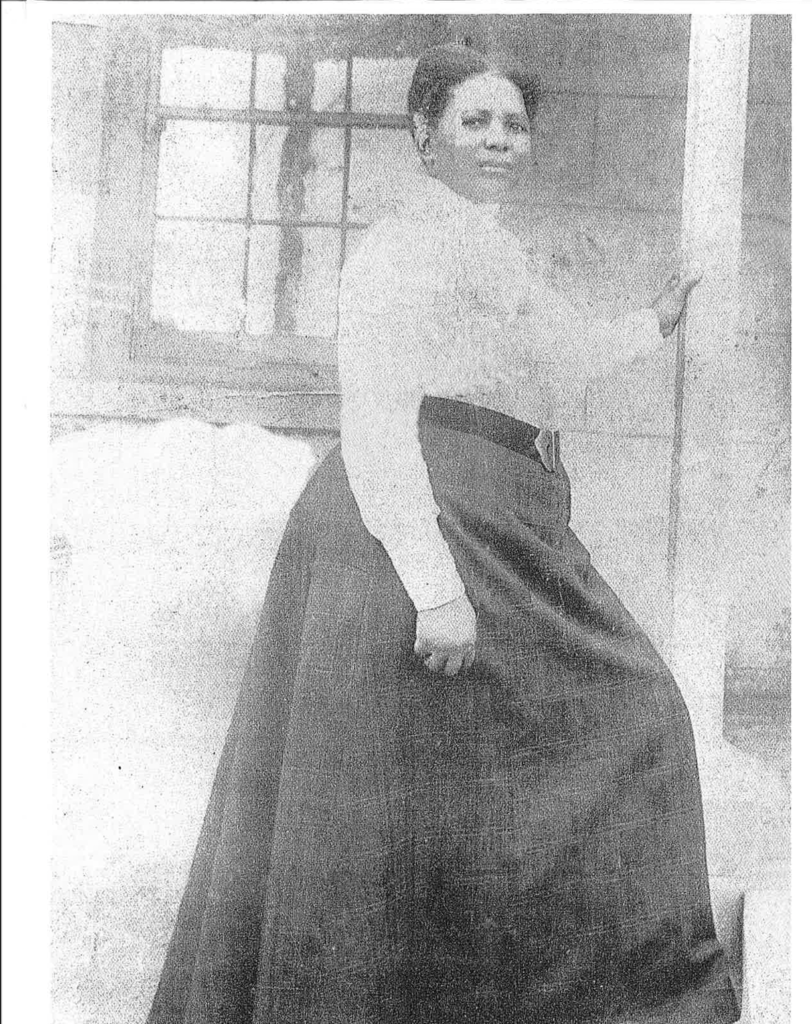
On Friday the 25th of August, Legacy Creates in collaboration with Masixole Makwetu Music is commemorating Nokutela Mdima-Dube with a musical tribute by critically acclaimed South African mezzo-soprano, Nonhlanhla Yende. “The objective is to commemorate a great woman in South African music. You know, not a lot of people know about Nokutela and her music. Even some music scholars have never studied Nokutela Mdima-Dube and have never encountered her in any way. They don’t know that this woman composed and published music in 1911. So Nokutela Mdima-Dube was born in 1873, which is exactly 150 years this year. This event is a tribute to her and commemorates all women. Celebrating the resilience, the beauty and inspirational creativity. For the first time, the audience can expect to hear some of Nokutela’s original songs performed by Nonhlanhla Yende.”
Asanda Sizani has curated Nokutela’s original music as it appears in Amagama Abantu: A Zulu Songbook. Tickets are available from Quicket and for only one R130. So, don’t miss out on this intimate occasion at the Rosebank Methodist Church in Cape Town. An apt location for this commemoration considering Nokutela was a missionary wife who attended a missionary school and spent her last days going from farm to farm until she became ill, preaching to people and using her life as a life of service to others. Mdima-Dube has been described as a spirit that is loud and dynamic with a refusal to rest without her story being told.
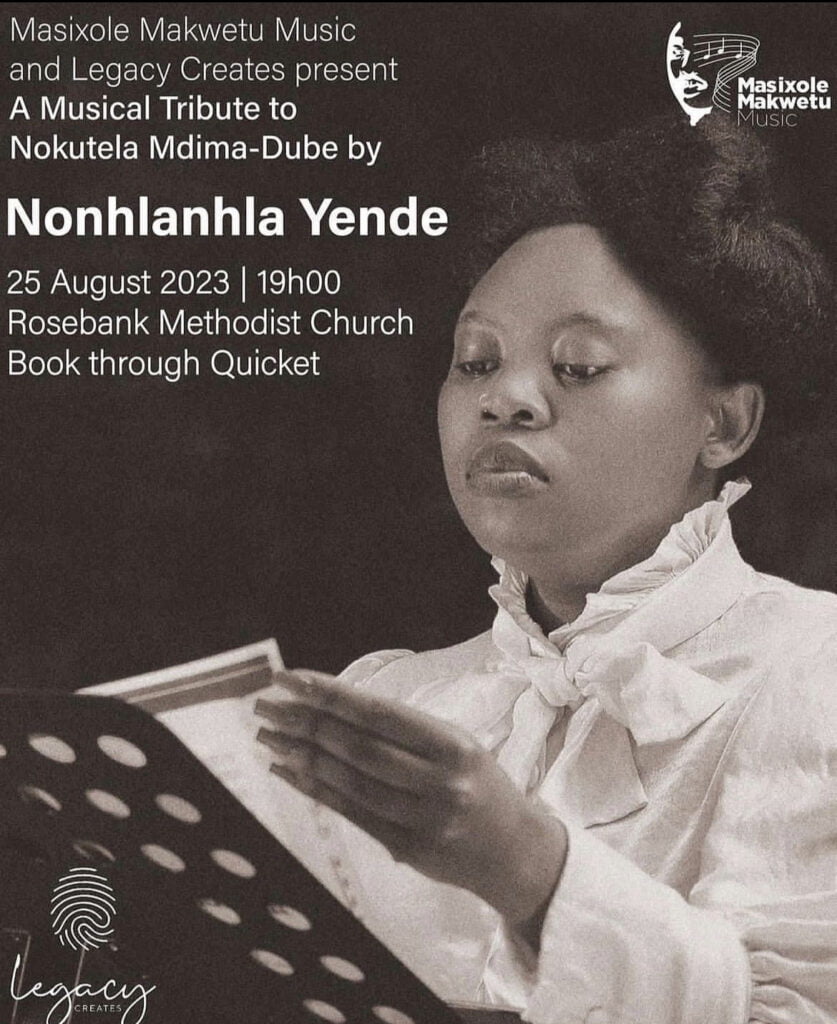
As Siphokazi Jonas writes of Nokutela, “She doesn’t want to be saved, she wants to be seen.” “I spoke to her 84-year-old great-descendant and she told me that “Nokutela has her people and she chose you.” She said she has a very alive spirit that refuses to die. You feel it each time you walk on the remains of what was once the first classroom at Ohlange Institute in 1899. You feel a palpable energy when you step into her former home and early classrooms.”
Legacy Creates has ensured that Nokutela is seen through their 2021 short film called Amagama ka Nokutela, which means “Nokutela’s Words or Nokutela’s Names” and a journal titled Nokutela Mdima-Dube 1919 – 2008. “Through the years we’ve been doing a series of different screenings of the film at various locations, participating in talks and panel discussions at institutions like the University of Cape Town. We continue to collaborate with fellow storytellers, working towards reclaiming Nokutela’s name and her words.”
As we reached the end of our interview, I asked Asanda who and what inspires her and this was her response, “Art and music inspire and just all disciplines of art. Whenever I have writer’s block, whenever I feel stuck, whenever I feel drained, whenever I need upliftment and whenever I need to see something hopeful about South Africa, I draw a lot of inspiration and energy from the arts. There’s just such an incredible variety of artists, especially the new emerging black artists, who are doing critical things at the moment.
When it comes to music, I come from a musical family. So, it’s an instant pick-me-up for me. In fact, the inspiration for the Nokutela projects started from her songbook. Music for me is the launching pad for a lot of what I do. Who inspires me the most? My mom, as corny and as cliche as that might be.”
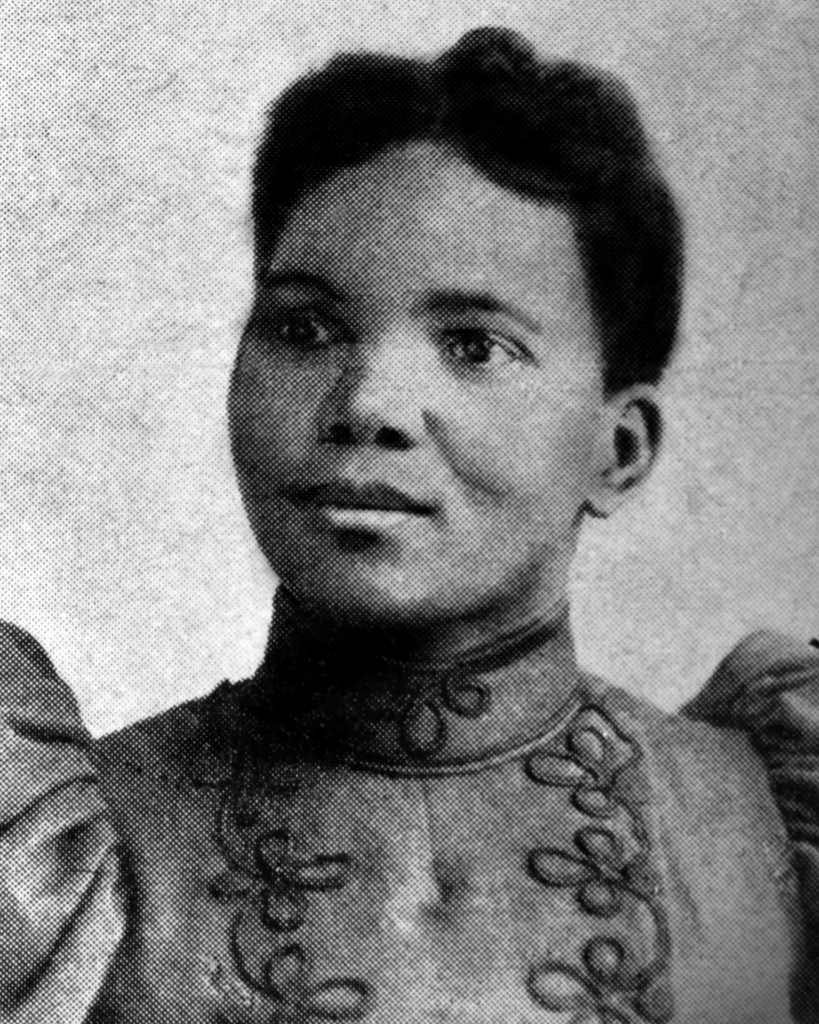
As she joyously spoke of the importance of music in her life and artistry, I asked her for 5 top songs that we could share with Nounouche readers and these were the recommendations:
1. Ungancami by Mandisi Dyantyis
“Everyone needs to hear the words, “Sukuma, vuthulula, ungancami” (Get up, brush yourself off and don’t give up). This song is a motivation not to give up.
“She’s just such an eccentric and cool personality. I love her sound. I just love her tone and her music. She’s an incredible performer.”
“She’s incredible. I’ve worked with and spent time with her. I worked on the music video for the song Losing You with Solange, I worked on her October 2012 ELLE cover in my first year as Fashion Editor there.”
4. Izivunguvungu by Urban Village
“The song says, “Izivunguvungu zalomhlaba ziyawukhathaz’umoya wami/ “Mama wam’, mina ngiyathanda ukuza kuwe”. That speaks to me because sometimes we experience so much turmoil and uncertainty in life. Our mothers are nurturers and healers and safe spaces. When we fall apart, they bring us back together.”
5. Everything Happens to Me by Samara Joy
“She’s a young, relatively new artist. Her velvety-smooth alto recalls the golden era of Jazz vocalists.”
I am so honoured to have had this thoughtful interaction with Asanda and I am so looking forward to watching her continue to spotlight the untold stories of African women like Nokutela Mdima-Dube and Noni Jabavu. Follow Legacy Creates to follow their future events and the outreach work they do at various schools, “We are always excited to do private screenings at Inanda Seminary and other schools because Nokutela was a schoolteacher. She was very dedicated to empowering and developing her community and children especially since she didn’t have biological children. So, for us to continue that work and realize dreams in her absence is important.”
“It’s important to reclaim women’s voices as far back as one can go. There are so many told and untold stories of great, heroic, ‘inconvenient’ women in our history. Nokutela Mdima-Dube is one of them. We need to undo the deliberate exclusion of women chapters in the history of our nation by speaking their names, honouring their contributions and documenting their existence.”
Asanda Sizani
Tickets to Friday’s soiree are available here.

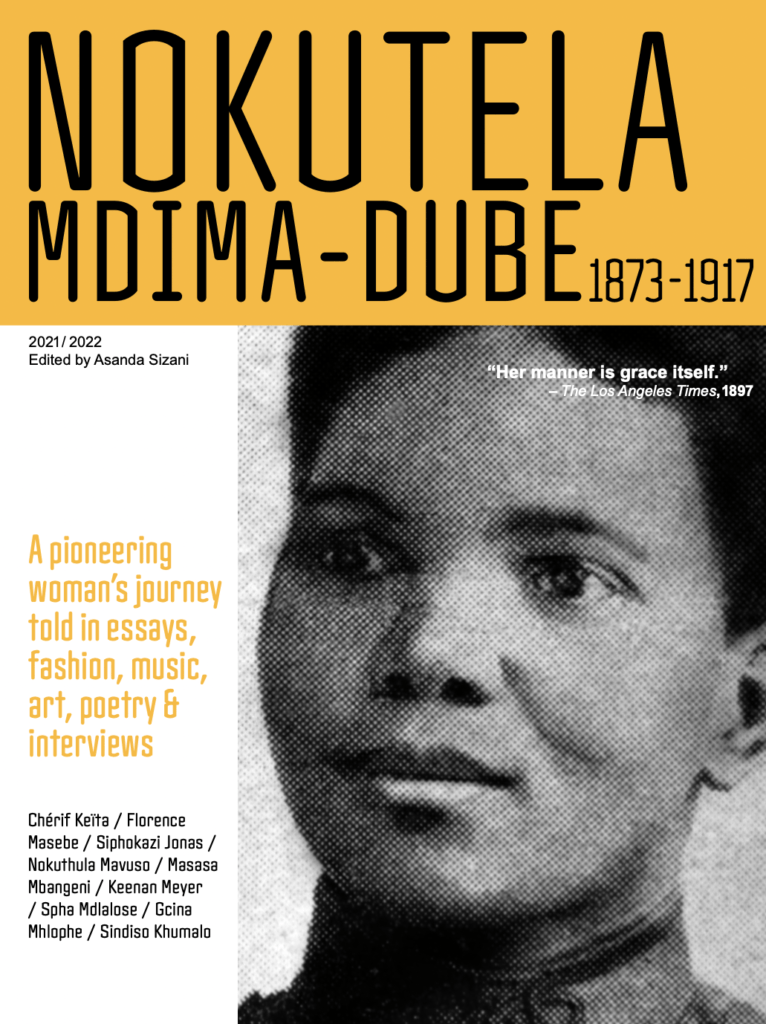
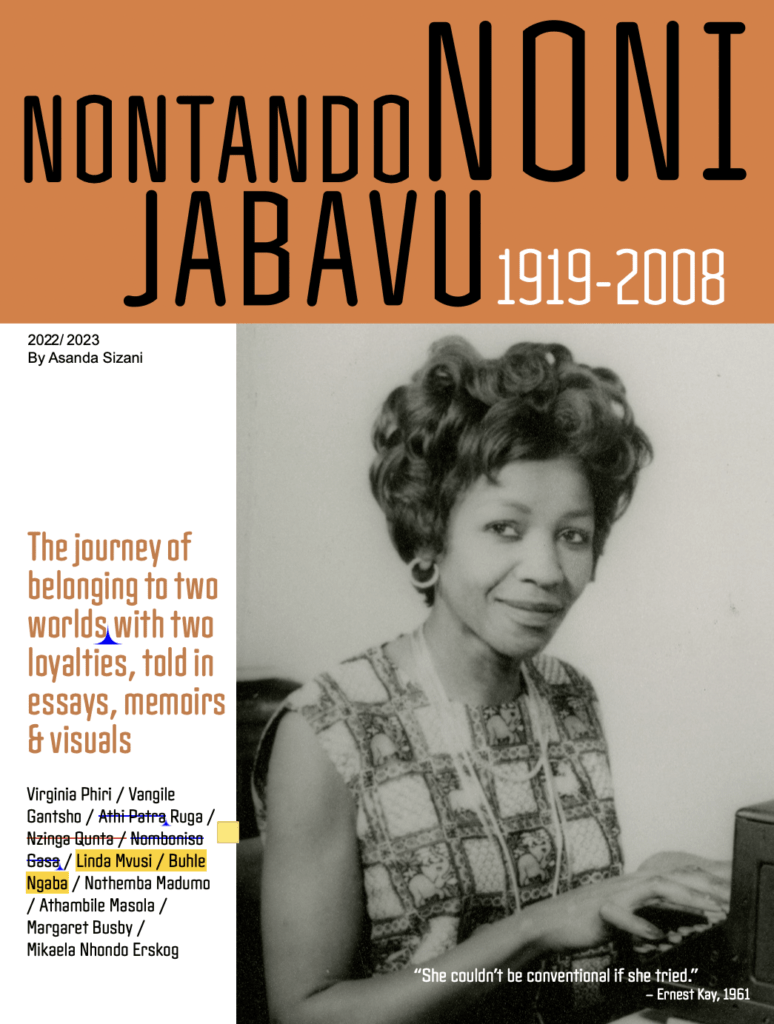

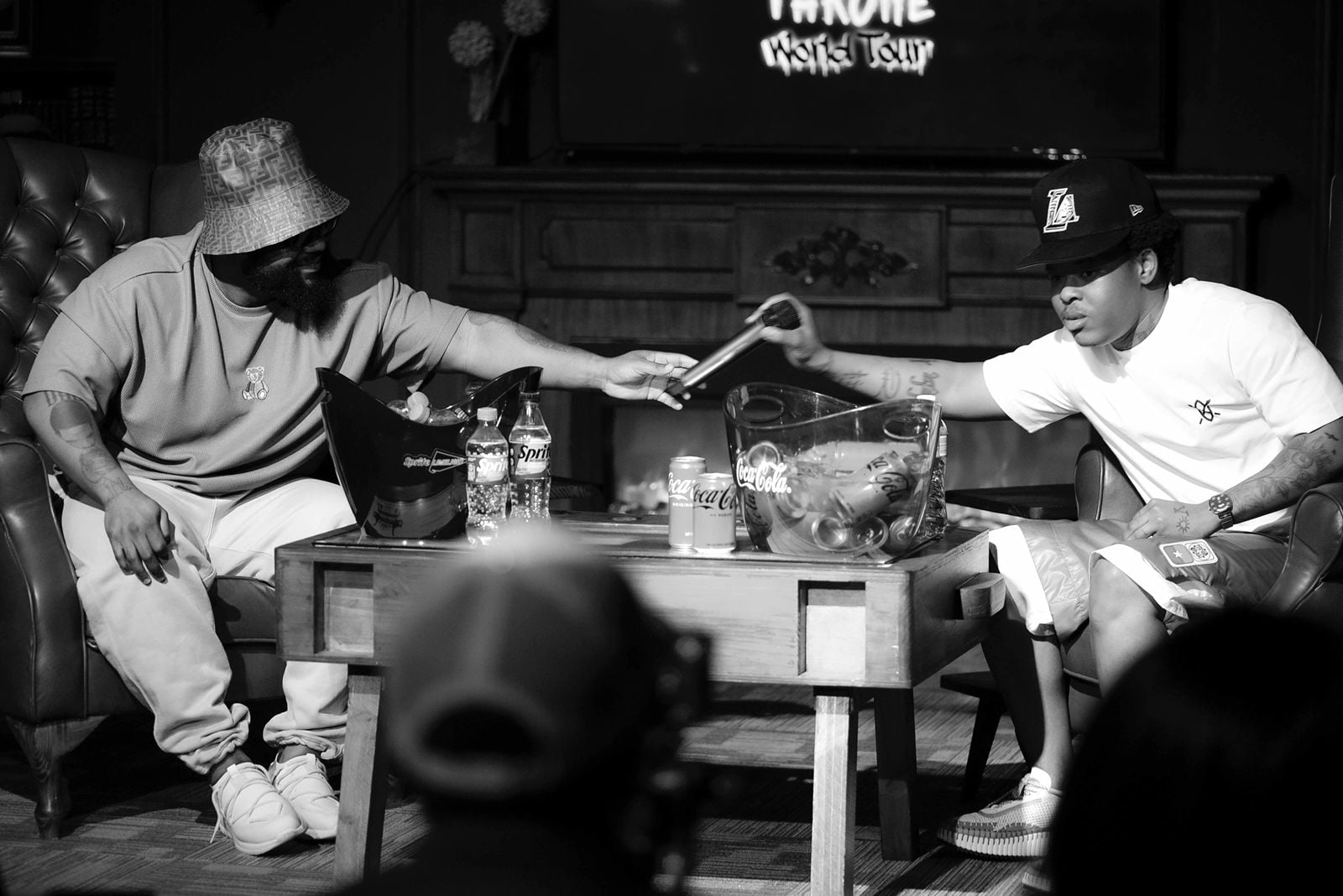


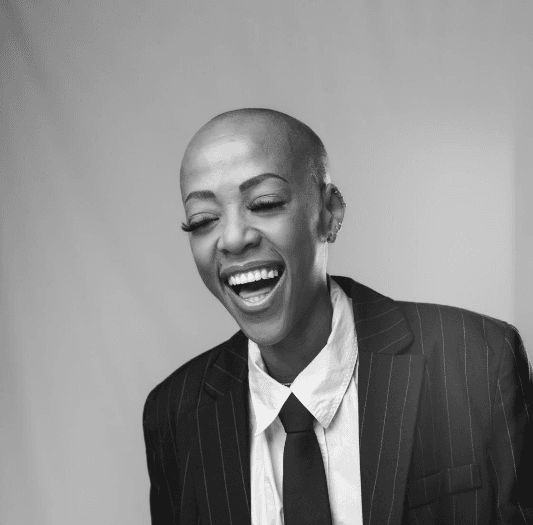
No Comments